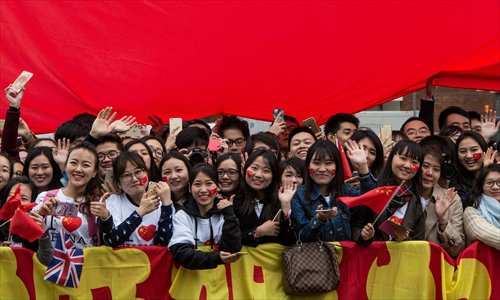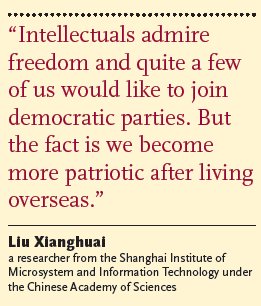CPC steps up efforts to bring students back from foreign schools into its fold
From restriction to preferential treatment, the central government's attitude toward students who have studied overseas has transformed over the years. By the end of last year there were 2.2 million such students that have returned to China. Through giving them more support and setting up Party committees within their associations, the CPC has stepped up efforts to increase its influence over this dynamic group.

Chinese students welcome Chinese President Xi Jinping as he arrives at Manchester Town Hall in Manchester, England on October 23, 2015 during his State visit to UK. Photo: AFP
"A meat bun thrown to a dog" was how Chinese leaders saw students who went abroad to study a few decades ago, according to Meng Guoqing, 73, who spent three years in the US starting in 1979.
As one of the first students whose overseas education was publicly-funded after the Cultural Revolution (1966-76), Meng and the 3,000 others that went abroad at that time have witnessed the transformation of official attitudes.
"From conservative to complete opening-up, that's my biggest impression of the change," Meng, 73, a retired engineer and deputy to the Huangpu district People's Congress in Shanghai, told the Global Times.
Recently, the General Office of the CPC Central Committee issued a guideline concerning the Western Returned Scholars Association & Overseas-educated Scholars Association of China (commonly known as the WRSA), asking local governments to give it preferential treatment.
The WRSA, the largest group for returnees, has also been asked by the central leadership to set up Party committees among its 30 branches to reach out to its 80,000 members, expand itself, and to fully play the role of a talent pool, advisory think tank and civilian diplomatic force for the country.
Meng, who joined the WRSA's Shanghai branch in 1984, believes it is essential to boost the Party's influence on the association, in which the majority of the members have no Party affiliation and are open-minded elites involved in business and academia.
Liu Xianghuai, a researcher from the Shanghai Institute of Microsystem and Information Technology under the Chinese Academy of Sciences who studied overseas, agrees that Party control is essential. "The historical experience and facts show that only under leadership of the CPC and through centralized management, can China realize prosperity and national rejuvenation," Liu told the Global Times.
"Intellectuals admire freedom and quite a few of us would like to join democratic parties. But the fact is we become more patriotic after living overseas," added the 79-year old scholar.
It's appropriate for the Party to lead the association's principle- and policy-making, but too tight a political grip should be avoided, Meng advised. "We hope the WRSA can be a home for the returned scholars, not a bureaucratic organ," he noted.

Birth
The WRSA was started in 1913 by a group of scholars in who had returned from the West to Beijing as a club to facilitate communication, learning and research. Non-governmental and not-for-profit, its activities at that time were mainly social, including parties, dinners, speeches and discussions, according to an article released in 2013 by zhijuzk, a public WeChat account run by a "group of senior journalists."
The club's founder Gu Weijun, a well-known diplomat and statesman for the Republic of China, recalled "it was founded without the slightest political intentions," according to an article reposted by the WRSA's Shanghai branch.
But as the majority of its initial members were government officials, it was not a truly apolitical organization. Although they held different political titles and thoughts, they were equal in the association and shared a consensus on defending the country's sovereignty, supporting patriotic movements against imperialism and feudalism, such as the May 4 Movement and resisting Japanese aggression.
In 1952 the government of the People's Republic gave the WRSA an official legal identity and tasked it with "striving for the return of Chinese students in capitalist countries." In 1957, then Premier Zhou Enlai announced that returned scholars "would be treated equally and free to stay or leave."
Partially due to the efforts made by the WRSA, such as writing letters to overseas students, about 3,000 scholars returned in the 1950s, including mathematician Hua Luogeng (1910-1985), Qian Xuesen (1911-2009), known as the father of Chinese rocketry and space technology, and founder of China's geomechanics Li Siguang (1889-1971).
However, during the Cultural Revolution when intellectuals - especially those with links to foreign countries - were viewed with suspicion, many overseas returnees were persecuted and the WRSA was disbanded.
Rebirth
As the chaos came to an end, China started its reform and opening-up under Deng Xiaoping's leadership. Some have pointed to the influence of his time overseas on the ideas that would make him one of China's greatest reformers.
Many early CPC leaders and some of the founders of the People's Republic studied overseas, including Zhou Enlai, Deng Xiaoping and Chen Yi. All three studied in France in the 1920s. Through work-study programs, they experienced western culture, changed their worldview and came to embrace Marxism. After returning to their homeland, they started to use and spread Marxism to lead the revolution.
In 1981, 10 returnee scholars jointly wrote to the United Front Work Department of the CPC Central Committee (UFWD), asking it to allow the WRSA to open again. In 1985, it was recognized as a publicly-funded organization directed by the central Party leadership.
There are 21 organizations directly under the leadership of the Secretariat of the CPC Central Committee, including the All-China Federation of Trade Unions, the Communist Youth League Central Committee, the China Writers Association and the WRSA.
However, the WRSA long remained loosely controlled. The names, function and administration mechanism were not dictated from above and many returnees are outside the association, according to a recent article published on a WeChat account run by the UFWD.
Official figures show that by the end of last year, 4 million Chinese nationals had studied overseas and around half of them had returned to the country. The total number of Chinese with foreign degrees is expected to double in the next 5 years said Wang Huiyao, Vice Chairman of the WRSA.
"It's very essential to build a unified network to serve and support this giant group of talents with international vision," Wang told the Global Times, noting that many returnee organizations have no budgeted posts, funds or offices.
The central government has decided to take action on this issue. In 2013, President Xi Jinping attended an event to mark the 100th anniversary of the WRSA's founding. In 2015, Xi remarked that foreign-educated people will be a new focus for united front work and a major target for the Party, together with prominent figures in new media and businessmen from the private sector.
In May, the General Office of the CPC Central Committee issued a guideline, striving to regulate and reinforce the WRSA, and to create ties between more overseas-educated people and the Party.
Wang Yongqing, a UFWD official, said the guideline will help the association to "lead the largest ever influx of returned scholars to be the force to realize the Chinese dream," according to a report by Oriental Outlook, a weekly run by the Xinhua News Agency.
Many returnees are pleased to receive this attention. Meng recalled that the government once placed restrictions on those wanting to study overseas and demanded students who went abroad pay for their State-funded Chinese college education before leaving. "At that time, the officials saw it was them leaving for the hostile side and saw them as irretrievable," recalled Meng, whose daughter went to study overseas in 1989.
In 1981, China officially allowed students to pay for themselves to study abroad. Before that, China sent political and technical elites to study overseas at public expense. Since 2000, the majority of Chinese students at foreign universities have been self-funded. But many of these students didn't return.
The country has launched a series of programs to attract talents back, offering incentives in terms of salary, housing and household registration.
In recent years, more and more students are choosing to return. Last year, 523,700 people went to study overseas, 409,100 returned, making the returnee to migrant ratio 1.28:1. But it was 3.15:1 in 2006.
Revival
The WRSA is open to all Chinese nationals with a bachelor's degree or above from overseas institutes of higher learning.
Through holding various activities, including start-up training classes, job fairs and cross-cultural exchange meetings, the association is attempting to gain influence.
Jiang Jing, an assistant research fellow with the Chinese Academy of Social Sciences, joined in 2006 the WRSA's branch for students who returned from Russia and CIS nations. Now the branch's coordinator in charge of membership registration, she said she has gained a lot from the association.
"We come from various walks of life. It's a big social network. We share overseas education memories," Jiang told the Global Times.
Liu Tianchu, 31, who studied in the UK, said the association helped a lot in starting up his business.
Through taking the classes provided by WRSA's Shanghai branch, he has learnt about how to write better business plans and the government's policies toward returnees, and managed to find a proper incubator and accelerator for his business, Liu told the Oriental Outlook.
However, many others feel the WRSA is remote. "I heard about the association, but feel it only targets the elite overseas students, such as those with scientific research results," Zhang Ziteng, who is studying HR at the Indiana University Bloomington, told the Global Times.
The association aims to enlarge its membership. The WRSA's chairman Chen Zhu, a former health minister, told the Oriental Outlook that the association has created a five-year plan and will guide and encourage returnees to actively serve the country's innovation-driven development strategy.
Newspaper headline: Returnee resources